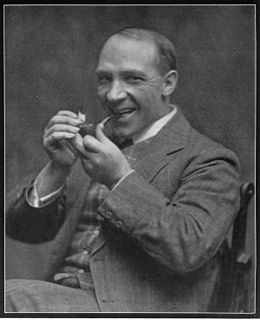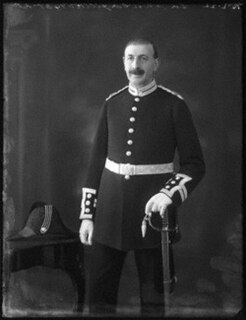Related Research Articles

Sir Henry Lauder was a Scottish singer and comedian popular in both music hall and vaudevillian theatre traditions; he achieved international success.

Alexander Hugh Bruce, 6th Lord Balfour of Burleigh, was a Scottish Unionist politician, banker and statesman, who took a leading part in the affairs of the Church of Scotland. He was Secretary for Scotland between 1895 and 1903.
The Scottish Renaissance was a mainly literary movement of the early to mid-20th century that can be seen as the Scottish version of modernism. It is sometimes referred to as the Scottish literary renaissance, although its influence went beyond literature into music, visual arts, and politics. The writers and artists of the Scottish Renaissance displayed a profound interest in both modern philosophy and technology, as well as incorporating folk influences, and a strong concern for the fate of Scotland's declining languages.

Alexander Asher was a Scottish politician and lawyer, who was elected as Member of Parliament for the Elgin Burghs constituency from 1881 until his death in 1905. He was also Solicitor General for Scotland on three occasions, and was Dean of the Faculty of Advocates.

The Killing Time was a period of conflict in Scottish history between the Presbyterian Covenanter movement, based largely in the south west of the country, and the government forces of Kings Charles II and James VII. The period, roughly from 1680 to the Glorious Revolution of 1688, was subsequently called The Killing Time by Robert Wodrow in his The History of the Sufferings of the Church of Scotland from the Restoration to the Revolution, published in 1721–22. It is an important episode in the martyrology of the Church of Scotland.
Lieutenant-Colonel Archibald Campbell Campbell, 1st Baron Blythswood, was a Scottish soldier, Tory politician, scientist and Grand Master of the Grand Lodge of Scotland.

Douglas Cuthbert Colquhoun Young was a Scottish poet, scholar, translator and politician. He was the leader of the Scottish National Party (SNP) 1942-1945, and was a classics professor at McMaster University and the University of North Carolina at Chapel Hill.
Sir Thomas David King Murray, Lord Birnam, was a Scottish advocate and judge who served for two years as Unionist Member of Parliament (MP).

Sir John Traill Cargill, 1st Baronet, DL, JP was a Scottish oil magnate.

Sir Herbert Eustace Maxwell, 7th Baronet, was a Scottish novelist, essayist, artist, antiquarian, horticulturalist, prominent salmon angler and author of books on angling and Conservative politician who sat in the House of Commons from 1880 to 1906.

Sir Hector James Wright Hetherington was a Scottish philosopher, who was Vice-Chancellor of the University of Liverpool from 1927 to 1936, and Principal of the University of Glasgow until 1961.
David Maxwell Walker was a Scottish lawyer, academic, and Regius Professor of Law at the University of Glasgow.
John McIntyre (1916–2005) was a Scottish minister and theologian. He was Moderator of the General Assembly of the Church of Scotland 1982/83 and Chaplain to the Queen in Scotland from 1990 to 1996.
The Glasgow Central by-election was a Parliamentary by-election. It returned one Member of Parliament to the House of Commons of the United Kingdom, elected by the first past the post voting system.
Sir Archibald Cambell Lawrie, FRCI was a British judge in Ceylon and scholar of Scottish legal history.
Events from the year 1834 in Scotland.
Philip Charles Lempriere was Dean of Glasgow and Galloway from 1959 to 1962.
Archibald Main, was a Scottish ecclesiastical historian, Church of Scotland minister, military chaplain, and academic. From 1915 to 1922, he was Professor of Ecclesiastical History at the University of St Andrews. From 1922 to 1942, he was Regius Professor of Ecclesiastical History at the University of Glasgow. He served as Moderator of the General Assembly of the Church of Scotland from 1939 to 1940.
Andrew Nevile Davidson, was a senior Church of Scotland minister. He served as Moderator of the General Assembly between May 1962 and May 1963.

James Melville Dron Hepburn was a professional golfer from Scotland who played in the late 19th century into the early 20th century. He once served as the secretary of the British PGA and later became one of the founding members of the PGA of America. As a player, he posted two top-10 finishes in the Open Championship, a T8 result in 1909 and a T10 finish in 1911.
References
- ↑ "Scottish Episcopal Clergy, 1689-2000" Bertie, D.M p596: Edinburgh T & T Clark ISBN 0-567-08746-8
- ↑ University Story
- ↑ Crockfords (London, OUP, 1929/30) p 82
- ↑ Scottish Postal Directories
- ↑ Deaths. The Times (London, England), Thursday, 18 February 1943; pg. 7; Issue 49473
| Anglican Communion titles | ||
|---|---|---|
| Preceded by Colin Campbell im Thurn | Dean of Glasgow and Galloway 1937–1943 | Succeeded by Philip Charles Lempriere |
| This biography of a Scottish religious figure is a stub. You can help Wikipedia by expanding it. |
| This article about a member of the Christian clergy in the United Kingdom is a stub. You can help Wikipedia by expanding it. |